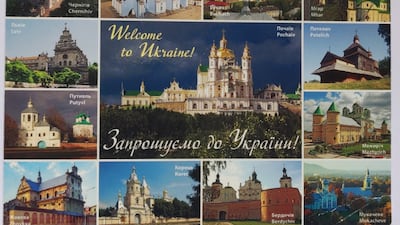I'm taking in the panoramic vista of downtown Kyiv. Saint Sophia Cathedral, a monumental 1,000-year-old building and Ukraine's most important world heritage site, is in the distance. The cathedral's green domes bathe in the reflection of the sun. The wind carries the distant murmurs of the Dnipro River that meanders lazily through the city, creating a surreal atmosphere. Washed in Ukrainian charm, I long for the breeze to sweep along my skin and ruffle my hair.
Ah! How I wish it was a real sight. Rather, it is a postcard I hold in my palm – one I received from Kyiv – that took me closer to Ukraine.
I've journeyed vicariously to far-flung corners of the world through picture postcards. The medley of interesting and unforgettable information and experiences includes soaking in cityscapes, witnessing bustling thoroughfares, familiarising myself with tea ceremonies, learning about flora and fauna, and exchanging pleasantries in different languages. Postcards have had a significant effect on my world view, broadening my understanding of places, cultures, and people through the eyes of a local.

Postcrossing, an online platform that allows users to write and mail postcards to people all over the world, was introduced to me by a friend a few years ago. It felt surreal to find a close-knit network of snail-mail lovers, scattered in every corner of the world.
Since then, I've collected more than 300 postcards from 40-plus countries, including the Aland Islands, Brazil, Lithuania, Israel, Japan, the US and Taiwan. But, the priceless ones in my collection are from Ukraine. Since Russia's offences against the country began in February this year, these are the ones I've kept close to my heart, reading the messages of life, love and hope a hundred times. I can't stop thinking about my kindred Ukrainian Postcrossers.
The card I held in my hand, which transported me for a brief moment to a scenic Kyivan setting, was from Anastasyia. This piece of mail, written in April 2017, travelled about 4,800 kilometres and took 50 days to reach where I live in Kolkata, India.

“I send you greetings from Kyiv – the capital of Ukraine,” she wrote, adding, “Today, people in my country celebrate Easter. It’s a tradition to bake Easter cakes and make coloured eggs and go to church early in the morning.” Her words reverberated excitement, transporting me to her world of joy and celebration. I now think about what Easter in Ukraine looked like this year with families separated, loved ones lost and churches destroyed.
In 2016, I sent my first postcard to Ukraine, to Vyktor. His profile stated his fondness for postcards that depicted art, nature, national costumes and people. Two weeks later, my colourful card of a Bharatanatyam dancer arrived in his mailbox. “Thank you for the nice card and coin,” he answered to my postcard via the forum. Offering my solidarity to Ukraine, I contacted him at the start of Russia's invasion of Ukraine. I am yet to hear from him.

Beyond these messages, which served as brief glimpses into someone's existence, the vivid stamps and views on my postcards have also taught me a lot about Ukraine. One stamp set commemorates the plants of Ukraine, grey alder, white mulberry, sea buckthorn and Persian walnuts, plants I never knew existed. The other stamp set displays the coats of arms of the Ukrainian cities of Chop in Zakarpattia Oblast, and Shatsk in Volyn Oblast, both in western Ukraine.
The colourful thumbnails on another postcard are of Ukraine's cultural landmarks, the Carmelite Monastery in Berdychiv, Korets Monastery in Korets, the Cathedral of the Nativity of the Blessed Virgin in Chernihiv, and Pochayiv Lavra monastery in Ternopil Oblast.
Victoria, the sender of the card, added in details about her life on the small writing space on the card. She described her love of theatre, movies, books, and fashion, she writes, in a hard-to-read handwriting: “On the card are the most famous places of Ukraine. Hope you’ll like it.”
For Victoria, I hope for the war to end, for the safety of Ukrainians and for peace in Ukraine. After so much destruction and loss, I know it will be a while before I can send (and receive) kitsch cards, cards that make long journeys by roads, rail and air, occasionally getting lost en route, and exchange heartfelt, albeit sometimes unreadable, hand-written messages.
Names have been changed throughout to respect privacy

